RELATIONS WITH THE EU
The European Union and Mauritania
The partnership between Mauritania and the European Union is based on regular political dialogue, economic and trade relations, and cooperation covering many priority areas, including significant humanitarian aid.
Political Relations
Mauritania is a signatory to the Samoa Agreement, the legal framework for partnership relations between the EU and the African, Caribbean and Pacific (ACP) countries. The agreement, signed in November 2023, replaces the Cotonou Agreement (2000-2023) and the Lomé Convention (1975-2000), and establishes common principles in priority areas such as human rights and democracy, peace and security, human and social development, inclusive and sustainable economic development, environmental sustainability and climate change, and migration and mobility. It also defines the framework and procedures for the partnership dialogue that is held regularly between the EU and Mauritania. The most recent was held on 20 February 2024.
Relations between the EU and Mauritania are strong and deepening. Although cooperation was suspended during the coups d'état of 2005 and 2008, it was fully restored in 2020, following the 2009 Dakar agreement restoring constitutional order and committing the government to strengthening governance, respect for human rights, the participation of civil society, dialogue with the opposition and the opening up of the media. Cooperation has been fully restored since 2010. Since then, the EU-Mauritania partnership has continued to grow stronger and deeper to promote the country's economic and social development, with cooperation programmes in various areas such as fisheries, rural development, food security, governance, security and human rights. The EU is also a key partner in the fight against terrorism and in improving security in Mauritania and the Sahel region.
During the Covid-19 pandemic, the Team Europe supported the National Multisectoral Response Plan to Covid-19 in Mauritania with EUR 35 million, supporting the economy, the incomes of modest households, food security, and small and medium-sized enterprises. The EU and its Member States have also supported the vaccination campaign by sending doses of vaccine to Mauritania through the Covax initiative.
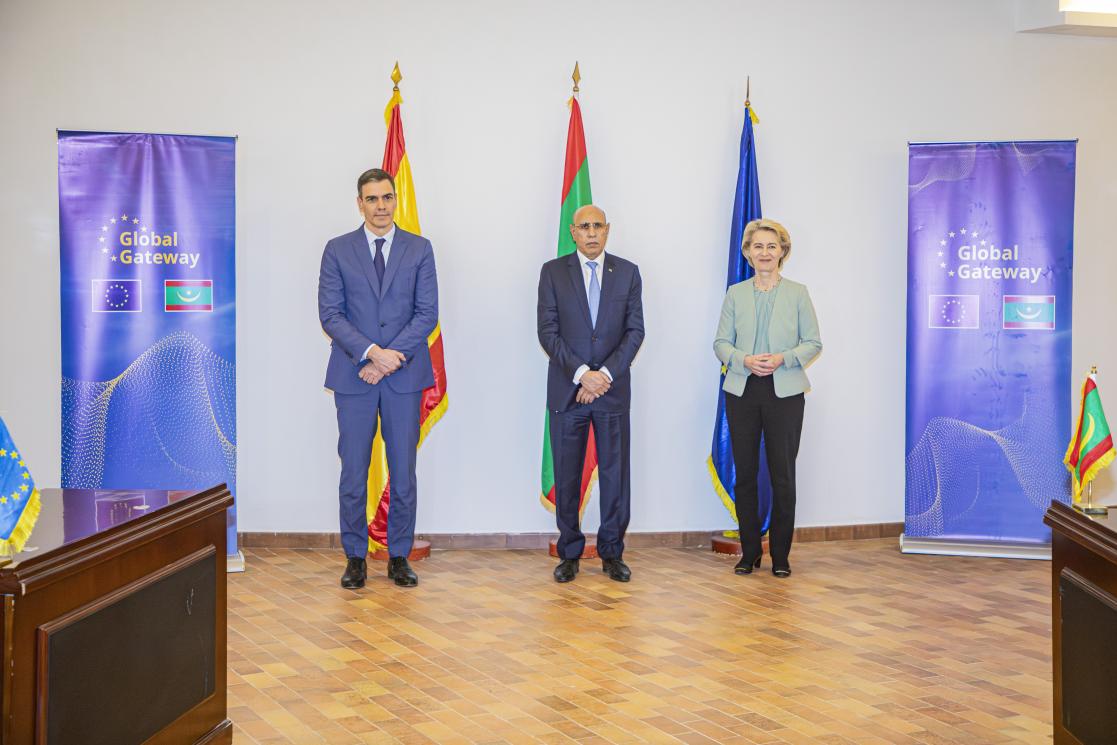
European Union, 2023
This solid partnership is reflected in regular exchanges at the highest level, and has been reflected in a series of high-level visits over the past year: visit by the Vice-President of the European Commission in October 2023, visit by the President of Mauritania to Brussels for the Global Gateway Forum (October 2023), visit by the President of the European Commission accompanied by the President of the Spanish Government (February 2024), visit by the Commissioner for Home Affairs (March 2024) and visit by the Director of the Africa Department of the European External Action Service (May 2024).
During the Commissioner for Home Affairs' visit to Nouakchott, a partnership and dialogue on migration issues was launched with the signing of a joint declaration with the Minister of the Interior (for more information: https://ec.europa.eu/commission/presscorner/detail/fr/ip_24_1335).
This partnership on migration with Mauritania establishes cooperation based on solidarity, shared responsibility and respect for fundamental human rights. It is based on five pillars:
1. Creating job opportunities: by strengthening access to vocational training and access to finance for businesses, and by improving the skills and competencies of young Mauritanians, particularly women.
2. Protection and asylum: by supporting Mauritania's efforts to deal with the arrival of refugees, starting with the reception capacities designed to protect the most vulnerable.
3. Promotion of legal migration: by encouraging mobility, particularly for students, researchers and entrepreneurs, and by studying further ways of strengthening circular mobility and access to the EU labour market for Mauritanians living in Europe and helping them to integrate.
4. Strengthening cooperation to prevent irregular migration: the aim is to combat the smuggling of migrants and trafficking in human beings, protecting the victims, by conducting joint investigations, improving security and cooperating on operational issues. Cooperation will also be strengthened on the return and readmission of Mauritanians residing illegally in the EU, while respecting their rights and dignity.
5. Strengthening border management: by stepping up cooperation on search and rescue operations and increasing the capacity of border management authorities, including through enhanced cooperation with Frontex, in particular on training and equipment.
Economic and Commercial Relations
The partnership between Mauritania and the European Union falls within the framework of the Samoa Agreement, which is the new partnership agreement between the European Union and the members of the Organisation of African, Caribbean and Pacific States (OEACP) from January 2024. This agreement will serve as the overall legal framework for relations between the two parties for the next twenty years. The agreement aims to strengthen the capacity of the EU and ACP countries to work together to tackle global challenges.
The European Union, which is one of the main international donors in Mauritania, provides grants to the State as well as loans, including for the private sector. It is in this context that the European Investment Bank (EIB), with the support of the European Commission, is signing loan agreements with commercial banks in Mauritania. The aim is to strengthen access to finance for the private sector in order to help diversify the Mauritanian economy and create employment opportunities. The loans will primarily be used to finance initiatives that benefit young people and women, as well as the country's sustainable development. For its part, the EIB is providing further support for the installation of a data-centre to secure the process of digitalising the country's economy, and for the construction of the second fibre-optic submarine cable to manage growing volumes of data and improve connectivity.
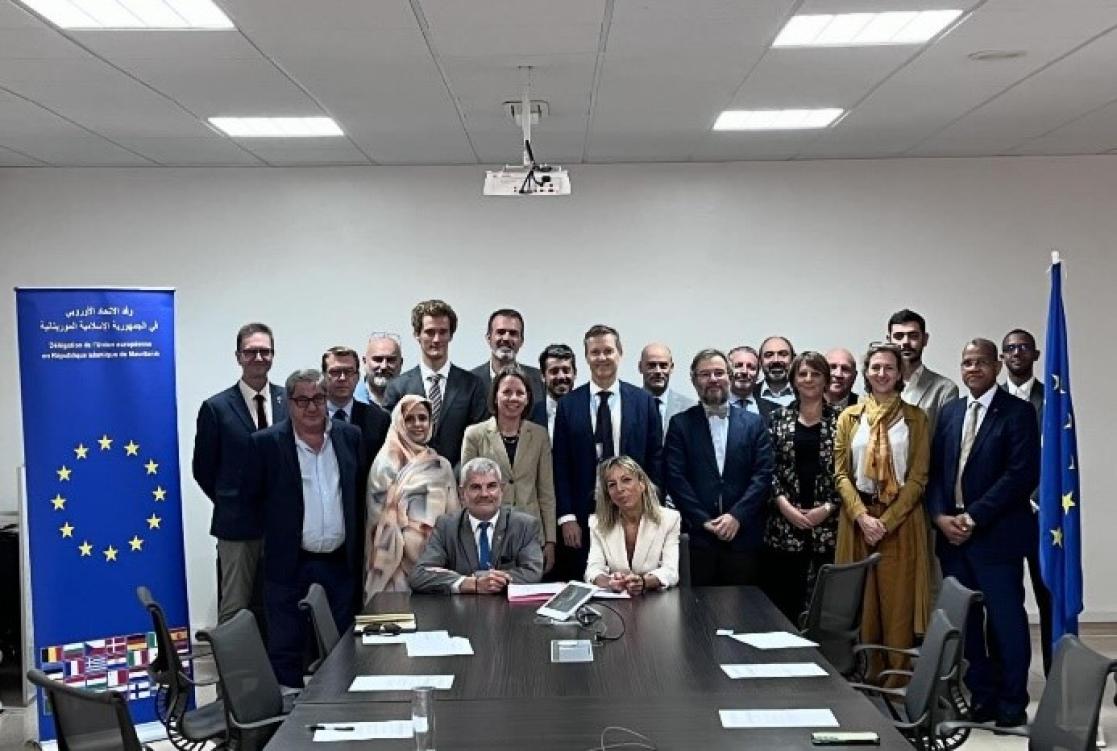
DUE Mauritanie
Europe is Mauritania's leading trading partner. Since 2018, Mauritania has been a signatory to the regional Economic Partnership Agreement (EPA) with 16 other African countries in ECOWAS and WAEMU. This agreement, which has not yet entered into force (in the absence of a signature by Nigeria) aims to open up new commercial opportunities for European investors, stimulate investment and develop production capacity in West Africa. To date, Mauritania benefits from the Everything But Arms (EBA) trade regime, which eliminates customs duties and quotas for all imports of goods into the EU, with the exception of arms and munitions. Mauritania has also signed the Sustainable Fisheries Partnership Agreement (SFPA), the EU's most important fisheries agreement, allowing European vessels to fish in Mauritanian waters in exchange for financial contributions.
In order to develop a business climate favourable to investment and to support the country's economic growth, in 2024 the EU encouraged the creation of the "Club d'Investisseurs Européens en Mauritanie (CIEM)". The Club is represented by European investors based in Mauritania or wishing to set up there to support the country's development and strengthen economic and trade links between Mauritania and the European Union.
Support for the Security - Development Nexus
Faced with the security challenges of the region and the instability of the Sahel, and because there can be no development without security, the EU and Mauritania are joining forces to strengthen regional security.
The EU is committed on the ground, through the mobilisation of several instruments including the African Peace Facility (APF) and the European Peace Facility (EPF), to consolidating the presence of the State throughout Mauritanian territory, strengthening the State's capacity to combat illicit trafficking, the fight against terrorism, and reinforced management of land and sea borders.
The EU Regional Advisory and Coordination Cell for the Sahel (RACC) has been present in Mauritania since June 2019, as part of a regional civilian Common Security and Defence Policy (CSDP) mission. Its action is part of the integrated approach in the Sahel, and aims to support the structures and countries of the Sahel, in order to support the strengthening of regional cooperation and operational capacities for defence and internal security.
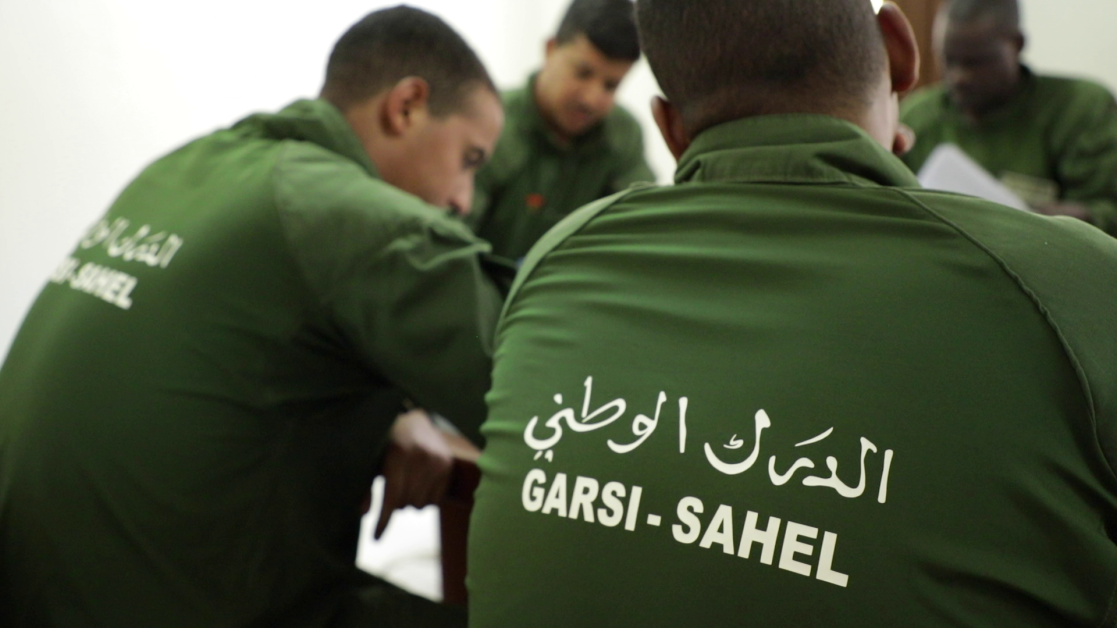
DUE Mauritanie
Dialogue with Civil Society
One of the objectives of the EU-Mauritania partnership is to encourage the emergence of an active, organised civil society that is involved in drawing up and implementing the country's development and sectoral strategies. To this aim, the EU encourages dialogue between institutions and citizens, and invites Civil Society Organisations (CSOs) and the State to contribute to any planning exercise with their complementary visions.
Regular meetings are organised between civil society actors, human rights organisations and representatives of EU Member States in Mauritania, as well as with technical and financial partners (TFPs). The aim of these meetings is to jointly assess the situation in the country, to understand the needs and demands of local players, and to give a voice to civil society associations in order to guide cooperation and development policies and actions.
Several funding programmes have been set up to support civil society, good governance and culture. PASOC (2006-2011) and PESCC (2013-2016) have helped to structure and strengthen grassroots organisations, as well as facilitating dialogue between the state and civil society organisations. Since 2014, a roadmap has promoted a coordinated approach between the European Union and its Member States with regard to engagement with civil society in Mauritania, in an enabling environment where competence and dialogue are key. The Roadmap 2022-2025 was signed in September 2023 by the Ambassadors of the EU Member States.

UE/GRDR/2024
Since 2016, the thematic support programme for "Civil society organisations" has been assisting and supporting the activities and strengthening of Mauritanian associations in partnership with local and international NGOs. Currently, this support is being provided through the Graines de Citoyenneté project, in partnership with French cooperation, which promotes and strengthens the role of young people and social cohesion. This programme is complemented by other instruments and projects, such as : EIDHR, which supports human rights defenders; the SEMAH project for Conflict Prevention and Promotion of Intercultural Dialogue, which aims to improve and increase the range of services and the involvement of young people, in particular by supporting CSOs in the prevention of conflicts and violent radicalisation; and various sectoral initiatives in the fields of health, education, employment, fisheries, justice, the environment, and transversally the promotion of women's rights, autonomy and leadership.
In 2021, the new Mauritanian Law on Associations, Foundations and Networks was approved, facilitating the registration of CSOs with a move to a declaratory regime while maintaining a monitoring and control system. This is an important framework for the professionalisation of Mauritanian associations and network coordination, encouraged by the European Union, particularly within the Civil Society Coordination Framework, which brings together the technical and financial partners (TFPs) that support civil society and via the monitoring of the implementation of the current Roadmap.
Development Cooperation
The partnership between Mauritania and the European Union dates back more than fifty years. It has evolved in line with the country's development priorities and the European Union's partnership policies.
The European Union is strongly committed to the inclusive and sustainable development of Mauritania and supports it through its various financial and technical instruments. Currently, the Neighbourhood, Development and International Cooperation Instrument (NDICI) - "Global Europe", in force for the period 2021-2027, is the EU's main instrument for international partnerships on sustainable development, climate change, democracy, governance, human rights, peace and security.

DUE Mauritanie/2024
As part of the 2021-2024 programming period, a budget of 125 million euros has been made available for Mauritania's development to pursue the following priorities: human development, the transition to a green and blue economy, and governance. In addition, to strengthen the partnership and support the country in meeting new challenges, an additional €50 million was announced in November 2022 by the President of the European Council, Charles Michel, during his visit to Mauritania, and a supplementary €210 million was announced by the President of the European Commission, Ursula Von der Leyen, during her visit on 8 February 2024. This funding is in addition to the resources already available through other instruments such as the European Development Fund (EDF), the Emergency Trust Fund for Africa (EUTF for Africa) and the Development Cooperation Instrument (DCI), among others.
The funding is part of the EU's Global Gateway strategy, which aims to support sustainable, inclusive and environmentally-friendly development in Mauritania. Three Team Europe Initiatives are working on "strengthening human development", "the transition to a green and blue economy" and "the green hydrogen ecosystem" with the member countries present in Mauritania: France, Germany, Italy and Spain.
They will also be used to support the partnership on migration between the EU and Mauritania, signed on 8 March 2024 by the two parties, and the actions of the Team Europe Initiative on the Atlantic migratory route, as well as strengthening stability in Mauritania.
To find out more: https://international-partnerships.ec.europa.eu/countries/mauritania_en
Fisheries and Maritime affairs
35 years of fisheries and fisheries development 1987-2022
Relations between the European Union and Mauritania in the fisheries and maritime affairs sector are long-standing, rich and constantly evolving. They are a reflection of history, human and commercial exchanges, converging economic interests and the diplomatic and cooperation relations established in the aftermath of Mauritania's independence.
For several centuries, the wealth of fisheries resources on the Mauritanian coast has attracted European fishing vessels and traders.
The common interests of European fishermen, Mauritania’s desire to make better use of its important resources and the growing demand for fish worldwide led Mauritania and the then European Economic Community to move together in 1987 to sign a parnership agreement in fisheries sector. The aim at the time was to move beyond a simple commercial and neighbourhood relationship to establish a sustainable strategic relationship in common.
In 2022, the EU and Mauritania were the biggest partners in the fisheries sector. We are bound by a Sustainable Fisheries Partnership Agreement (SFPA) signed in 2021, which is fully in line with the United Nations Convention on the Law of the Sea (UNCLOS) and which is implemented through implementing protocols. With a view to sustainability and in accordance with the principles set out in the UNCLOS Convention, the European Union is negotiating fishing opportunities on the basis of the best available scientific advice, taking into account the needs of the Mauritanian fleet and its own fleet.
The current protocol (2021-2026) allows European fishermen to fish up to 288 000 tonnes of fish and shrimp each year in different fisheries. In exchange for access to its fishing zones, Mauritania receives an annual financial contribution from the EU (EUR 57.5 million for the first two years of the current Protocol; this contribution will be revised from the 3rd year) and support for the fisheries sector (EUR 16.5 million over 5 years). In addition, annual licence and catch fees for shipowners amount to EUR 36.5 million per year, if quotas are fully fished. In addition, 2% of pelagic catches (potentially 4,950 t/year) are given to the Société Nationale de Distribution du Poisson (SNDP), which is responsible for distributing them at low prices to the Mauritanian population in need.
From a commercial point of view, the main destination in terms of value of fresh or frozen fish exports remains the EU (33% of exports in value terms, i.e. around EUR 180 million for 44 000 t, 2020 data). This opening-up to the European market is possible in particular by the successful cooperation between the Mauritania's Health Inspectorate (ONISPA) and the EU’s health and food safety services (DG SANTE). The export procedure also requires an effective cooperation mechanism between the Port of Nouadhibou, the Coast Guard (inspection, catch count), ONISPA and Customs in order to tranship/unload and export European catches from Nouadhibou and Nouakchott.
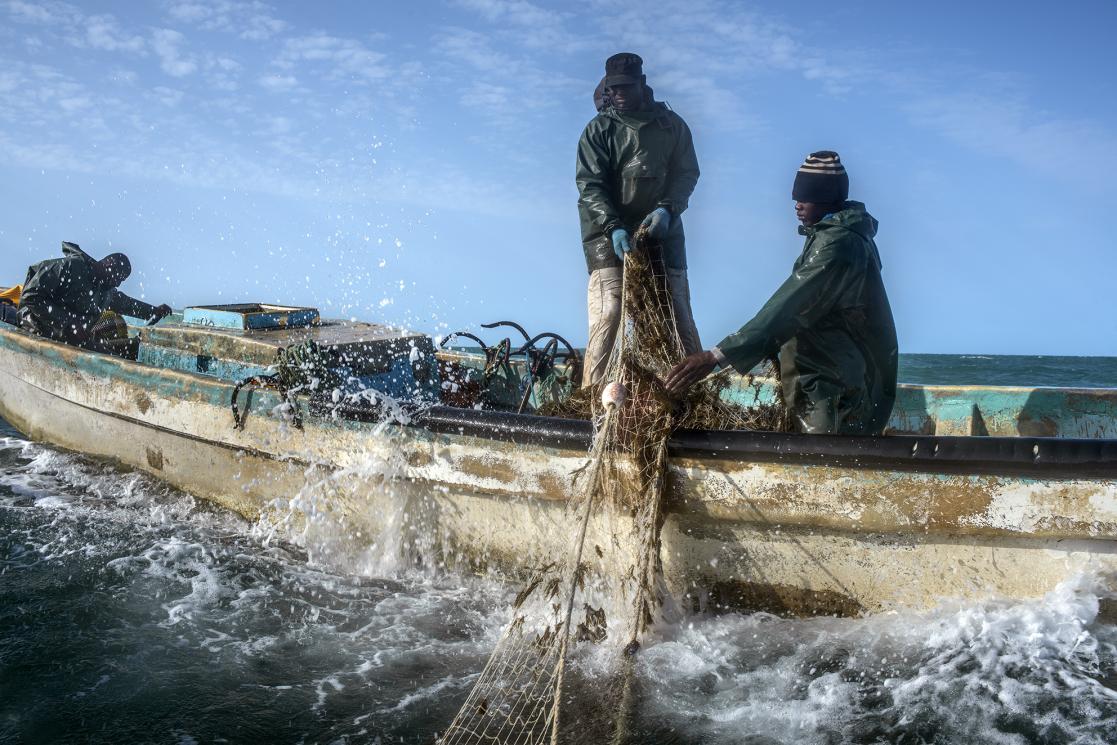
DUE Mauritanie
Overall, fishing activities between Europe and Mauritania are one of the main sources of foreign currency for this Sahelian country (excluding mining activities: iron, gold and copper). They generate intense economic, social and human relations. Around 60% of the sailors working on European vessels are Mauritanian. European fishing activities in Mauritania represent a significant source of employment, both at sea and on land. These synergies are the result in particular of funding to support the sector, from which the Naval Academy benefits (secondary and higher technical training).
The SFPA also helps to strengthen the sustainable governance of fisheries in Mauritania, in particular through cooperation between scientists within the framework of the Joint Scientific Committee, a body created by the partnership. In addition to fisheries research (IMROP), this DPSA also helps to finance fisheries surveillance and control (Coast Guard), export health control (ONISPA), and the operation of marine protected areas (Banc d'Arguin, Diawling, BACOMAB), thereby helping to preserve fisheries resources.
This funding is one of the tangible results of the financing in support of the sector that has been included in the fisheries agreements since the first agreement signed in 1987. It represents a significant contribution to the development of the sector (small-scale, industrial and commercial fishing) and to its credibility on the international stage. Beneficiaries include institutions responsible for fisheries surveillance, fisheries research, port infrastructure (Nouakchott, Nouadhibou, Tanit), training, health inspection, shipyards, the Banc d'Arguin National Park, the Diawling National Park and the BACOMAB Trust Fund. Sectoral support under the fisheries agreement is not the only instrument that the European Union makes available to Mauritania to develop its fisheries sector. The Emergency Trust Fund for Africa, the European Development Fund (regional projects, support for civil society) and the NDICI are mobilised in a coherent and complementary manner. They support the implementation of the National Strategy for the Fisheries Sector and the Maritime Economy, in line with European strategic objectives. The emergency trust fund helps to develop added value in small-scale fishing and to create decent jobs in this area, while regional projects support regional cooperation and the fight against illegal fishing (PESCAO) and the use of satellite images (MESA).
The "civil society" thematic line aims to strengthen and structure small-scale fishing professionals. In the private industrial sector, the European Investment Bank has successfully granted two loans to flagship Mauritanian companies, MIP-Frigo in Nouakchott and SEPH in Nouadhibou, as well as contributing to the dredging of the mineral port of Nouadhibou.
To find out more: https://oceans-and-fisheries.ec.europa.eu/fisheries/international-agreements/sustainable-fisheries-partnership-agreements-sfpas/mauritania_en
Humanitarian Aid
Located between the Maghreb and the Sahel, Mauritania is one of the poorest countries in the world, suffering recurrent shocks such as its Sahel neighbours. More than 30 % of its population lives in multidimensional poverty, lacking access to healthcare, education and acceptable living conditions.
Since 2007, the EU has been providing humanitarian aid to Mauritania as a matter of urgency in the areas most affected by food insecurity and malnutrition, thus strengthening the capacity of Mauritanian institutions to deal with these crises.
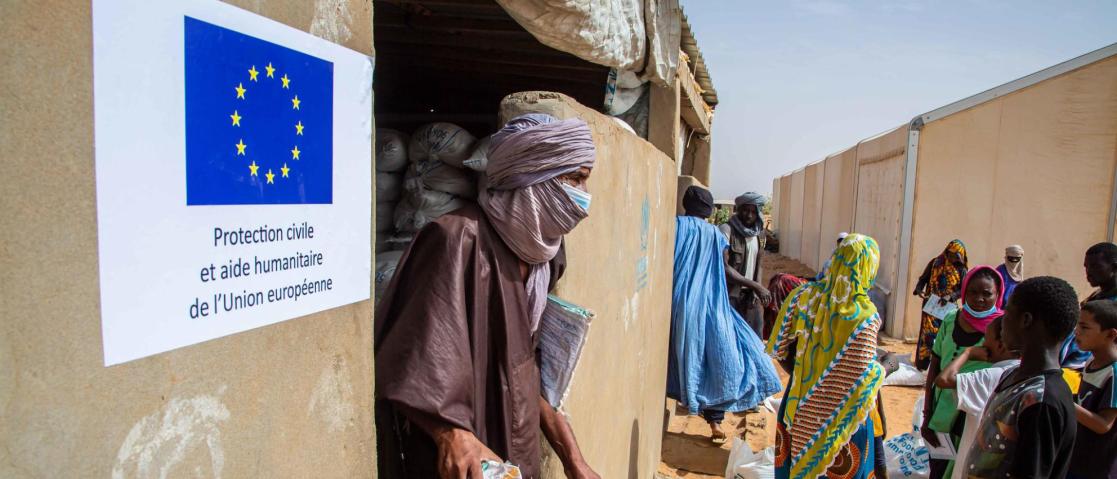
Union européenne, 2023
In recent years, Mauritania is facing an increase in forced displacement, exacerbated by the crisis in neighbouring Mali. The EU’s humanitarian aid has supported vulnerable Malian refugees, helping them through the lean season. Mauritania is home to the largest Malian refugee camp, who have been moving there since 2012 to escape insecurity and violence. Due to the continued instability in Mali, the influx of refugees continues to increase, and their return prospects remain very limited. The camp now exceeds the size of most Mauritanian urban agglomerations, and many refugees have been living there for ten years.
Humanitarian needs include access to basic services, protection and food assistance, as refugees living in an area already affected by droughts, agro-pastoral conflicts and the low resilience of host communities. The immediate needs of refugees, returnees and host communities aggravate the country’s long-term needs.
The EU’s humanitarian efforts are part of a responsible and gradual exit strategy. The EU has involved local and national partners in the implementation of its response, which is coordinated in a synergistic way with European development actors, foreign policy and other diverse sectors.
For more information: https://civil-protection-humanitarian-aid.ec.europa.eu/where/africa/mauritania_en
Global Gateway
